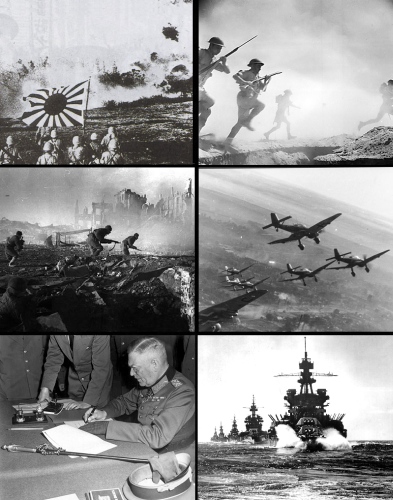We don't use intrusive ads and hope you disable your adblock.

World War II
Description
World War II, or the Second World War (often abbreviated WWII or WW2), was a global military conflict which involved most of the world`s nations, including all great powers, organised into two opposing military alliances: the Allies and the Axis. The war involved the mobilisation of over 100 million military personnel, making it the most widespread war in history. In a state of "total war," the major participants placed their entire economic, industrial, and scientific capabilities at the service of the war effort, erasing the distinction between civilian and military resources. Over seventy million people, the majority civilians, were killed, making it the deadliest conflict in human history.
The start of the war is generally held to be September 1, 1939, with the invasion of Poland by Nazi Germany and subsequent declarations of war on Germany by most of the countries in the British Empire and Commonwealth, and by France. Many countries were already at war before this date, such as Ethiopia and Italy in the Second Italo-Abyssinian War and China and Japan in the Second Sino-Japanese War. Many who were not initially involved joined the war later, as a result of events such as the German invasion of the Soviet Union, the attacks on Pearl Harbor and British colonies, and subsequent declarations of war on Japan by the United States, the Netherlands, and British Commonwealth.
In 1945, the war ended in a victory for the Allies. The Soviet Union and the United States subsequently emerged as the world`s superpowers, setting the stage for the Cold War which continued for the next 46 years. The United Nations was formed in the hope of preventing another world conflict. The acceptance of the principle of self-determination accelerated decolonization movements in Asia and Africa, while Western Europe itself began moving toward integration.
------
About the picture
Top left: Battle of Wuhan
Top right: Second Battle of El Alamein
Middle left: Battle of Stalingrad
Middle right: German dive bombers over Eastern Front winter 1943-1944
Bottom left: Wilhelm Keitel signing German Instrument of Surrender
Bottom right: Invasion of Lingayen Gulf
The start of the war is generally held to be September 1, 1939, with the invasion of Poland by Nazi Germany and subsequent declarations of war on Germany by most of the countries in the British Empire and Commonwealth, and by France. Many countries were already at war before this date, such as Ethiopia and Italy in the Second Italo-Abyssinian War and China and Japan in the Second Sino-Japanese War. Many who were not initially involved joined the war later, as a result of events such as the German invasion of the Soviet Union, the attacks on Pearl Harbor and British colonies, and subsequent declarations of war on Japan by the United States, the Netherlands, and British Commonwealth.
In 1945, the war ended in a victory for the Allies. The Soviet Union and the United States subsequently emerged as the world`s superpowers, setting the stage for the Cold War which continued for the next 46 years. The United Nations was formed in the hope of preventing another world conflict. The acceptance of the principle of self-determination accelerated decolonization movements in Asia and Africa, while Western Europe itself began moving toward integration.
------
About the picture
Top left: Battle of Wuhan
Top right: Second Battle of El Alamein
Middle left: Battle of Stalingrad
Middle right: German dive bombers over Eastern Front winter 1943-1944
Bottom left: Wilhelm Keitel signing German Instrument of Surrender
Bottom right: Invasion of Lingayen Gulf
